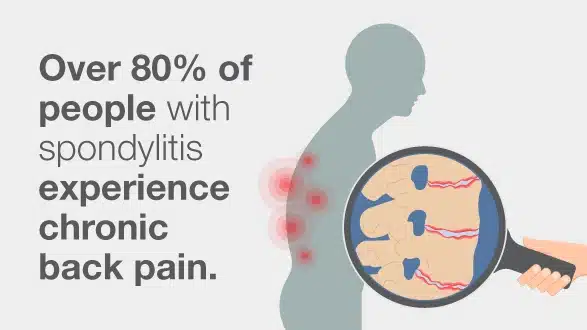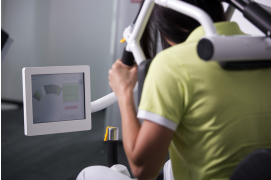Request Appointment
Enter your details and we will be in touch with you shortly;
Or call
8655885566
between 8 am and 8 pm.

An inflammatory arthritis affecting the spine and large joints.

Ankylosing spondylitis can result in a variety of musculoskeletal symptoms beyond the commonly known back pain and stiffness. Some patients experience additional discomfort that may affect various parts of the body. Pain may radiate from the spine to the neck, shoulders, or hips. To help manage these effects, many individuals benefit from a comprehensive approach that includes physical therapy for spondylitis and exercises for ankylosing spondylitis.
Symptoms can vary from person to person and are heavily dependent on the severity of the ankylosing spondylitis. Some of the more common symptoms include:
 Professional diagnosis required
Professional diagnosis required Chronic, can last for years
Chronic, can last for years Treatable with 4 weeks of QI Spine Therapy
Treatable with 4 weeks of QI Spine TherapySpondylitis is one of the most common causes of neck and back pain. The exact causes of spondylitis are unknown, but there are certain factors that increase the risk of spondylitis, including:
 Professional diagnosis required
Professional diagnosis required Chronic, can last for years
Chronic, can last for years Treatable with 4 weeks of QI Spine Therapy
Treatable with 4 weeks of QI Spine TherapyConventional spondylitis treatment focuses mainly on pain medications, which only manage the symptoms of the condition but do not address the root cause of the problem.
QI Spine implements some of the most technologically advanced diagnostic and treatment methods to reduce pain and help patients manage spondylitis so that they can lead healthy, productive lives.
Spondylitis affects the structures of the spine and typically causes a 'hunched forward' posture. This places a great deal of stress on the muscles that support the spine.
QI Spine uses the most advanced spine function test - the Digital Spine Analysis (DSA) to pinpoint muscles and structures that have been affected by spondylitis. This allows QI spine doctors to create targeted treatment protocols to strengthen these muscles, which reduces pain and improves muscle function and mobility.
Treatment protocols are unique to each patient, depending on how the condition has affected them - this allows spine doctors to provide the best spondylitis treatment for each patient, depending on their individual requirements. QI's treatment plans for spondylitis focus on 4 phases - diagnosis, isolation, reverse 1, and reverse 2.
After the initial diagnosis and pain management, our spine doctors will use isolation movements and neurodynamics to help decrease pain. The reverse 1 stage involves core activation to strengthen the targeted muscles, while the reverse 2 stage increases the intensity of these medical movements to reduce and even prevent pain recurrence.
It is important to consult a spine specialist as soon as possible to manage spondylitis and reduce your pain so you can lead a full and productive life.
For patients with persistent symptoms, other measures that could be called for are as follows:
The matter is that the changes in diet, the level of activity, and ergonomics are likely to enhance the quality of life to a great extent.
Where possible, treatments like spondylitis relief treatment are preferred over invasive methods.
In more severe cases, options may include biologic drugs for spondylitis or even spinal fusion for severe spondylitis, though these are considered when conservative methods fail.
Combining regular spondylitis therapy sessions with targeted spondylitis treatment methods offers a comprehensive approach to managing the multifaceted symptoms of this chronic condition.
 Professional diagnosis required
Professional diagnosis required Chronic, can last for years
Chronic, can last for years Treatable with 4 weeks of QI Spine Therapy
Treatable with 4 weeks of QI Spine Therapy
Conventional spondylitis treatments focus mainly on pain medications which only manage the symptoms of the condition but do not address the root cause of the problem.
QI Spine Clinic uses some of the most technologically advanced diagnostic and treatment methods to reduce pain and help patients manage spondylitis so that they can lead healthy productive lives.
Spondylitis affects the structures of the spine and typically causes a 'hunched forward' posture. This places a great deal of stress on the muscles that support the spine.
QI Spine Clinic uses the most advanced spine function test - the Digital Spine Analysis (DSA) to pinpoint muscles and structures that have been affected by spondylitis. This allows QI spine specialists to create targeted treatment protocols to strengthen these muscles which reduces pain and improves muscle function and mobility.
Treatment protocols are unique to each patient depending on how the condition has affected them - this allows spine specialists to provide the best spondylitis treatment for each patient, depending on their individual requirements. QI's treatment plans for spondylitis focus on 4 phases - diagnosis, isolation, reverse 1, and reverse 2.
After the initial diagnosis and pain management, our spine specialists will use isolation movements and neurodynamics to help decrease pain. The reverse 1 stage involves core activation to strengthen the targeted muscles while the reverse 2 stage increases the intensity of these medical movements to reduce and even prevent pain recurrence.
It is important to consult a spine specialist as soon as possible to manage spondylitis and reduce your pain so you can lead a full and productive life.
 Professional diagnosis required
Professional diagnosis required Chronic, can last for years
Chronic, can last for years Treatable with 4 weeks of QI Spine Therapy
Treatable with 4 weeks of QI Spine Therapy
At QI Spine, the diagnosis is done by asking about the patient’s history, conducting a thorough physical examination, and doing DSA (Digital Spine Analysis test), which helps in analyzing the root cause of the problem. It is a non-invasive functional test that helps in measuring spine function. Its controlled and guided movements help in determining the mobility of the spine, strength, and imbalances of muscles around the spine.
CT scans, MRIs, and X-rays often fail to pinpoint the exact source of pain, whereas DSA directly analyzes muscle tissue to identify the root cause. Here is how DSA is conducted & its benefits:
 Professional diagnosis required
Professional diagnosis required Chronic, can last for years
Chronic, can last for years Treatable with 4 weeks of QI Spine Therapy
Treatable with 4 weeks of QI Spine Therapy



Have a question?
Ask our spine specialists
Who is a QI Spine Specialist?
A QI Spine Specialist is a medical expert with

Dr. Nidhi Sanghvi Shah

Dr. Shital Gaikwad

Dr. Richa Bhatia
9000 hours
of specialisation in treating back and neck conditions
32 hours
of spine physiotherapy specialisation methods in McKenzie concepts, Kinetic control, Neurodynamic solutions, Mulligan’s concepts
500 hours
and 6 months of QI Spine specialisation courses
Swimming, walking and exercises for ankylosing spondylitis are an easy type of exercise that will not have an impact on the joints. Specific endurance exercises to maintain posture in spondylitis such as, daily alteration of the lumbar curve, gentle movements that engage the abs such as pelvic tilts or chest expanders must be performed.
Poor mobility, weakness, and general inactivity, ill posture, or extensive participation in vigorous activities like running would only worsen joint rigidity and inflammation. Chronic stress and smoking also worsen the disease state by enhancing systemic inflammation.
Vitamin D is crucial, as deficiency is common in spondylitis and it supports calcium absorption and bone health. Adequate levels can reduce disease activity and improve overall spondylitis management.
The primary type is ankylosing spondylitis; the spectrum of others includes inflammatory, starting with psoriasis (psoriatic arthritis), following an infection (reactive arthritis), related to inflammatory bowel disease (enteropathic arthritis), and when the type cannot be identified (undifferentiated spondyloarthritis). Each involves spinal inflammation but differs in associated symptoms.
Proper spinal pillows and lower back support belts are useful in cases of flare-ups but should be viewed as an adjunct to exercise and spinal therapies.